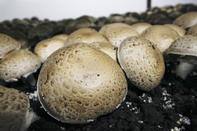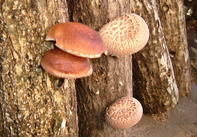The commercial production of edible mushrooms has increased more than 30 times since 1978, with shiitake (Lentinus edodes) making up about 22% of the world’s mushrooms.

Other important mushroom types include oyster, button and brown mushroom (Agaricus spp) enoki and edible mushrooms of jelly fungi (Auricularia spp). These five mushroom types make up 85% of cultivated mushrooms in the world.
Apart from cultivating a valuable food material that can potentially contribute to food security, mushroom production is also an efficient utilisation of agricultural byproducts such as chicken manure and wheat straw.
Mushrooms are a nutritious food source that can be used as a meat replacement and it has many health and medicinal benefits. In addition, after mushroom production, the used substrate (mushroom compost) is suitable as a soil fertilizer due to its ability to increase organic matter content in the soil.
What is a Mushroom?
Not an animal and also not a plant, mushrooms belong to the fungi kingdom. Mushrooms are the fleshy bodies of fungi with a stem, cap and gills but it may also include certain types with no stem. Mushrooms grow on a substrate that it uses as a food source as it has no chlorophyll and cannot produce its own food like a plant.
All mushrooms produce spores (or ‘seeds’) which spread by air, while the rest of the mushroom then matures as it grows on the organic substrate. In the wild, this substrate can be rotten wood, but in commercial mushroom farms, this substrate is compost.
World Production of Mushrooms

China is the world’s biggest producer (and consumer) of mushrooms with over 5 million tonnes produced each year. Italy (761 000 tonnes), the USA (390 000 tonnes), the Netherlands (301 000 tonnes) and Poland are other notable producers.
South Africa produces about 21 000 tonnes per year (2018) with half the mushroom producers in Gauteng, 28% in the Western Cape, and 17% in KwaZulu-Natal. Some South African mushrooms are exported, mostly to neighbouring countries such as Namibia and Mauritius.
History of Mushroom Farming in South Africa
The first mushroom farm in South Africa was probably that of gynaecologist Dr Charles Kark in an area that is now central Sandton. In fact, the stream running through the green park in the centre of Johannesburg’s central business district refers to ‘Silver Stream’ the name of the mushroom farm and cannery that thrived during the 1950s and 1960s. It was later sold to Tiger Brands and then to Tongaat Mushrooms, which by then already incorporated Denny Mushrooms.
The South African Mushroom Farmers’ Association (SAMFA) was established in 1984 and uses membership fees for research and marketing.
By Marinda Louw
For bulk or Mushroom export enquiries please use the enquiry link below.